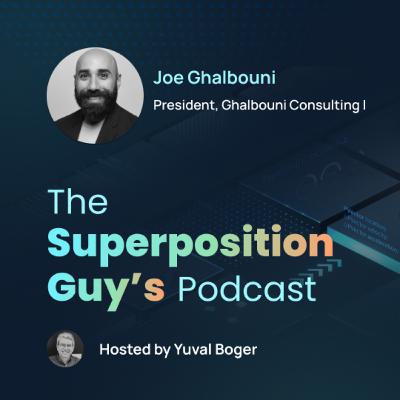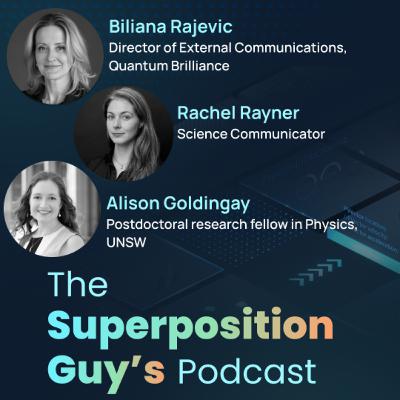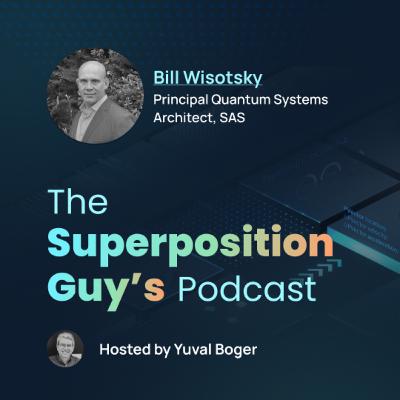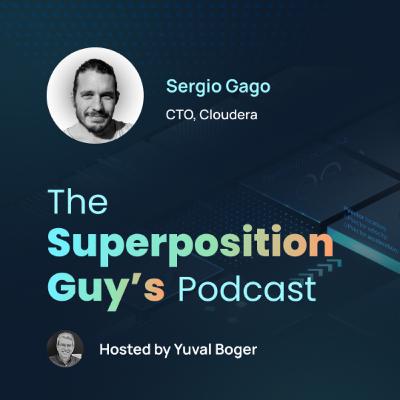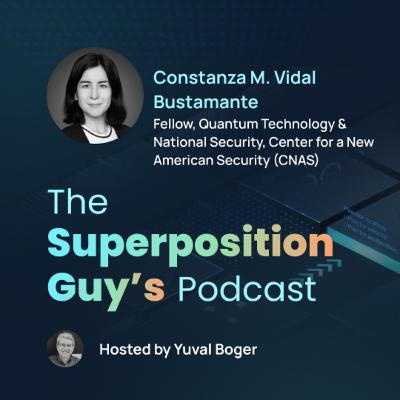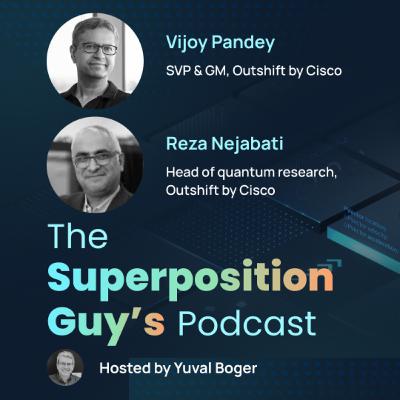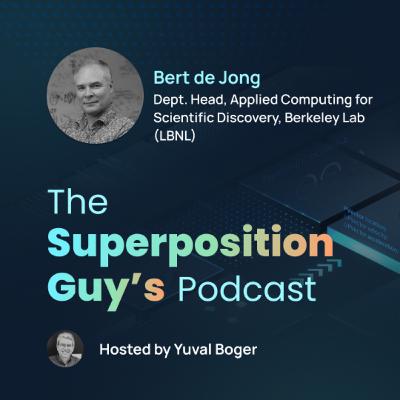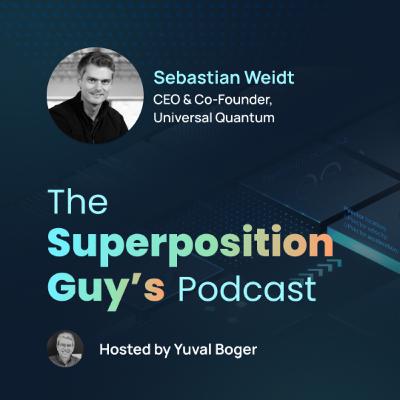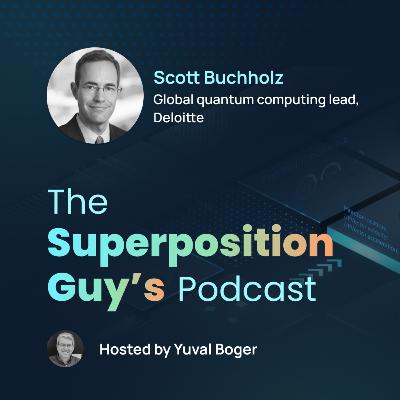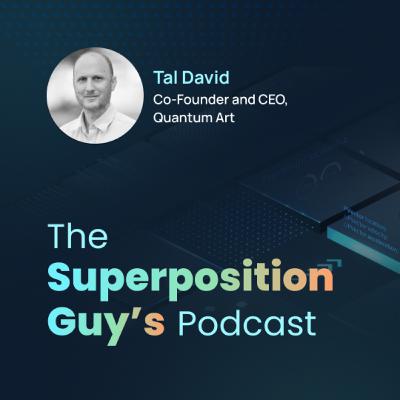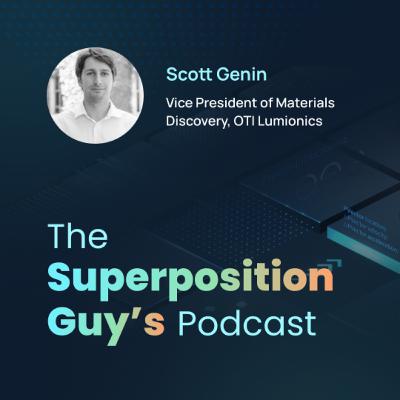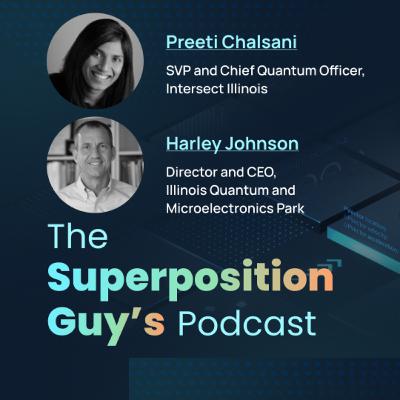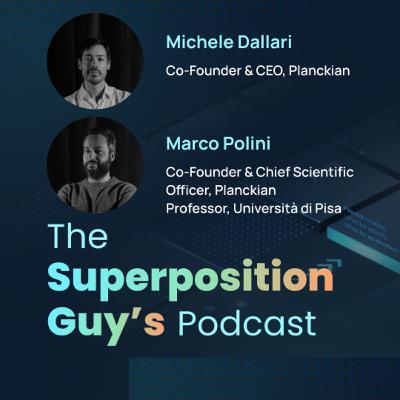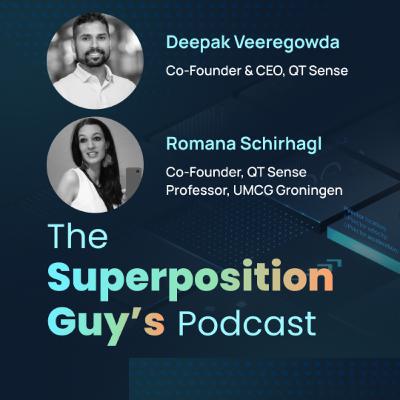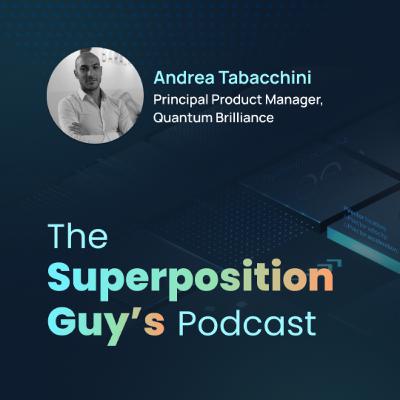Discover The Superposition Guy's Podcast
The Superposition Guy's Podcast

The Superposition Guy's Podcast
Author: Yuval Boger
Subscribed: 40Played: 1,062Subscribe
Share
© Yuval Boger
Description
Yuval Boger, Chief Commercial Officer at QuEra, hosts thought leaders in quantum computing, quantum sensing, and quantum communications to discuss business and technical aspects that impact the quantum ecosystem. Full transcripts are available at podcast.yboger.com
152 Episodes
Reverse
Vishal Chatrath, CEO and co-founder of QuantrolOx, a quantum control software company focused on automating qubit tuning and calibration, is interviewed by Yuval Boger. They discuss how automation accelerates chip characterization, supports scalable manufacturing, and feeds into real-time calibration and error correction. The conversation covers competition in quantum control, open architectures, fundraising challenges, and what it takes to industrialize quantum hardware.
Yuval Boger interviews Zach Yerushalmi, CEO of Elevate Quantum and leader of the U.S. Quantum Tech Hub. They discuss how to accelerate quantum commercialization through industry-led ecosystems, targeted public–private partnerships, and clear prioritization across research, industry, and market failures. Zach draws parallels to semiconductors and biotech, emphasizing demand signals, advanced market commitments, and cycle time as key success metrics. The conversation highlights the high geopolitical stakes of quantum and the urgency for the U.S. to execute its industrial strategy correctly.
Jonathan Reiner is interviewed by Yuval Boger and describes his path from condensed-matter physics to leading the Product Solutions team at Quantum Machines. They discuss the rising complexity of quantum control, customer trends toward fidelity, low-latency compute, and automated calibration, as well as QM’s products such as QUA, Qualibrate, and OPX-NIC for error-correction workflows. Jonathan shares insights on scaling control electronics, the skills needed to operate quantum computers, and his preference for spin qubits. The conversation concludes with a discussion of IP protection practices.
Kike Miralles, investment director at Intel Capital, is interviewed by Yuval Boger. They talk about corporate venture investing in quantum technologies. Kike explains Intel Capital’s focus on quantum hardware and middleware, compares leading modalities, and outlines emerging themes like QPU scale-out networking, hybrid classical–quantum error correction, and the growing role of logical qubits as a core metric. He also discusses check sizes and stages, government-heavy revenue, PR and hype in quantum, expected consolidation among hardware players, and what differentiates strong quantum investors and startups in today’s market.
Dr. Joe Ghalbouni, a quantum communication PhD who moved from academia into Point72’s innovation team and now runs Ghalbouni Consulting, is interviewed by Yuval Boger. They discuss how he helped a major hedge fund move from quantum curiosity to concrete education, use case discovery, and POCs, and why he believes the real bottleneck today is not hardware but algorithms and sector-aware problem mapping. The conversation explores where quantum is most promising in financial services, from optimization to quantum machine learning, and how quantum inspired methods on classical hardware are already delivering value. They also cover PQC and QKD roadmaps, what it really takes to move a quantum solution into production, and why Joe is surprisingly optimistic about seeing useful quantum advantage in specific use cases within the next few years.
Biliana Rajevic, Head of External Communications at Quantum Brilliance and co-founder of Quantum Women, Rachel Rayner, a science communicator and comedian, and Alison Goldingay, a quantum researcher at UNSW. We discuss the "Elevating Quantum Women's Voices" program, an initiative designed to empower women in the quantum industry to communicate effectively and build their visibility. They share insights from the program's curriculum, such as the power of storytelling, adapting to different audiences, and the specific challenges of presenting on Zoom. Rachel describes her "Quantum Comedy" shows that blend humor with physics, while Alison and Biliana demonstrate the program's "60-second challenge" by explaining single-photon detection and diamond-based quantum computing in plain English. We also explore the broader importance of diversity in the quantum ecosystem, and much more.
Laurence Coldicott, curator of global quantum technology conferences, is interviewed Yuval Boger. They discuss how enterprise engagement has expanded beyond early adopters in finance to logistics, pharma, and defense—and how agendas now balance computing with “quantum defense” topics like PQC and QKD. Laurence contrasts U.S. scale and federal momentum with Europe’s fragmented landscape, notes attendance growth from hundreds to over a thousand, and describes a successful new event in Doha. He emphasizes keeping conferences pragmatic and hype-free, prioritizing practitioner talks and real case studies, and offers advice to speakers: be candid about maturity, challenges, and near-term value. They touch on rising government participation, the growing intersection with AI and cyber, and much more.
Bill joins Yuval Boger to discuss SAS’s vendor-agnostic, hybrid approach to quantum and analytics. Highlights include D-Wave warm-starts that let SAS prove optimal kidney-exchange solutions in seconds, as well as QML pilots for fraud and bankruptcy modeling and disaster response. He shares a pragmatic definition of “quantum advantage”, treating QPUs as just another PU alongside CPUs/GPUs, and why rapid progress toward error correction—and ideas like Penrose’s—keep him learning.
Sergio Gago, CTO of Cloudera and former Head of AI & Quantum at Moody’s is interviewed by Yuval Boger. They discuss a practical, problem-first path to quantum in finance. Sergio contrasts annealers and gate-based systems, emphasizes hybrid workflows for portfolio optimization and Monte Carlo risk, and explores fraud detection and knowledge-graph use cases. Sergio stresses rigorous benchmarking against top-end GPUs/FPGAs, explainability for regulators, and total cost of ownership over lab metrics. They also touch on post-quantum cryptography (offense vs. defense), realistic definitions of “quantum advantage,” and why disciplined pilots—and candid vendor comparisons—matter more than hype, and much more.
Constanza Bustamante, a research fellow at the Center for a New American Security (CNAS) is interviewed by Yuval Boger to discuss quantum policy at the nexus of national and economic security. Constanza contrasts China’s state-led, scale-oriented model with the U.S.’s science-first, private-sector translation approach; traces bipartisan continuity from the National Quantum Initiative Act through today; and examines Europe’s growing techno-nationalism and reciprocity gaps. Constanza argues broad tariffs risk hobbling a nascent U.S. quantum supply chain, explores quantum sensing as a near-term “atomic advantage”, weighs research-security safeguards against academic openness, and much more.
Vijoy Pandey, who leads Cisco’s Outshift incubation group, and Reza Nejabati, Cisco’s head of quantum research, are interviewed by Yuval Boger. They discuss Cisco’s strategy to enable distributed quantum computing and a future “quantum internet.” Vijoy and Reza explain why Cisco won’t build QPUs, focusing instead on room-temperature, telecom-band entanglement networking. They discuss Cisco's aim is to make networking a “no-brainer” and push modality complexity to the edge via transducers and even entanglement-mode conversion, the argument that scale-out plus scale-up will reach “million usable qubits” faster, and much more.
Bert de Jong, Director of the Quantum Systems Accelerator (QSA) at Berkeley Lab, is interviewed by Yuval Boger. Bert describes how the center develops superconducting, trapped-ion, and neutral-atom technologies in parallel, and the importance of certification in verifying quantum computations. They discuss the roadmap for integrating quantum into HPC at NERSC, the cost and scaling challenges of large systems, and the Department of Energy’s focus on scientific—not cryptographic—applications. Bert also highlights creative approaches to error correction, opportunities for industry collaboration, the need for workforce training starting in high schools and community colleges, and why he believes quantum will deliver practical scientific impact within five years.
Sebastian Weidt, CEO and co-founder of Universal Quantum, is interviewed by Yuval Boger. They discuss his company’s unique approach to building scalable trapped-ion quantum computers. Sebastian explains how Universal Quantum focuses on overcoming key scaling challenges—such as error-free modular connections, laser-free control, and integrated electronics—rather than rushing small systems to market. He contrasts their 70K cooling and qubit-shuttling architecture with other modalities, addresses trade-offs like gate speed, and shares why algorithmic execution speed can offset slower clock cycles. Sebastian and Yuval also talk about the company’s €70M DLR contracts, its emphasis on software alongside hardware, and Sebastian’s view that quantum utility will likely emerge north of 10,000 qubits. Reflecting on entrepreneurship, he shares lessons learned about market education, the company’s engineering-heavy team, and much more.
Scott Buchholz, global leader for Deloitte Consulting's quantum computing efforts, is interviewed by Yuval Boger. Scott explains how Deloitte helps clients understand quantum technology and its potential applications, particularly in solving business problems. They discuss the timelines for quantum computing becoming commercially useful, referencing industry roadmaps. He emphasizes Deloitte's role in bridging the gap between technical jargon and business needs, helping clients navigate vendor selection, shares insights into the learning curve associated with quantum computing, highlights Deloitte's work in developing quantum-inspired machine learning solutions, and much more.
Yuval Boger interviews Tal David, CEO and co-founder of Quantum Art, a quantum computing company based in Israel focused on full-stack quantum computing with trapped ions. They discuss Quantum Art's unique architecture, which emphasizes sophisticated multi-qubit gate operations, optical tweezers for segmenting ion chains, and dynamic reconfigurability for scaling up to millions of qubits. Tal highlights the company's roadmap, including launching a 50-qubit system by 2025 and a 1,000-qubit system by 2027, with a long-term goal of achieving a million-qubit system. Tal also addresses the challenges and advantages of their approach, particularly regarding error correction and speed, and mentions collaborations with companies like NVIDIA and BlueQubit, emphasizes the importance of focusing on scalable architectures, and much more.
Scott Genin, Vice President of Materials Discovery at OTI Lumionics, is interviewed by Yuval Boger. Scott outlines his role in overseeing materials design and simulation programs, focusing on OLEDs and cathode patterning materials. He highlights OTI's growth and its strategic integration of quantum-inspired methods due to current limitations in quantum computing. Scott remains optimistic about the future of quantum but emphasizes the need for further advancements, particularly regarding error correction and cost efficiency. He also shares insights on a novel encoding method that allows OTI to emulate up to 80 qubits classically, significantly improving their simulation capabilities. They segway into the potential for quantum computing to impact vibronic spectra calculations, the importance of achieving meaningful results within a competitive business environment, and much more.
Preeti Chalsani, Chief Quantum Officer at Intersect Illinois, and Harley Johnson, CEO of the Illinois Quantum and Microelectronics Park, are interviewed by Yuval Boger. Preeti and Harley discuss the rapid creation and ambitious goals of the IQMP, a state-backed initiative to support the scale-up of quantum computing and microelectronics. They talk about the park’s public-private structure, a $500M infrastructure investment by the state, early tenants like PsiQuantum and and Diraq, and its emphasis on workforce development and cross-sector collaboration. They also explore Illinois’ unique advantages as well as the challenges of infrastructure timelines, community impact, managing expectations in a fast-moving field, and much more.
Michele Dallari, co-founder and CEO, and Marco Polini, co-founder, of Planckian, are interviewed by Yuval Boger. Michele and Marco talk about their company’s novel superconducting chip architecture, which uses global control and always-on ZZ interactions to drastically reduce wiring complexity and improve scalability. They discuss the advantages of controlling many qubits with just two or three classical lines, their early-stage experimental progress, and the software adaptations required to compile algorithms for their architecture. The conversation also touches on Italy’s growing quantum ecosystem, Planckian’s collaborative approach to chip manufacturing, their excitement about recent advances in pulse engineering to compensate for fabrication imperfections—and much more.
Romana Schirhagl, co-founder, and Deepak Veeregowda, CEO of QT Sense, are interviewed by Yuval Boger. QT Sense develops quantum sensing technology using NV center sensors in nanodiamonds for biomedical applications. Romana explains how their technology measures magnetic noise from free radicals inside cells, indicating cellular stress, similar to a small-scale MRI. Deepak discusses the company's product, Quantum Nova, which is available for research and diagnostic purposes, particularly in cancer and infectious disease detection. QT Sense describes their technology as having subcellular resolution and nanomolar sensitivity, sees a key advantage in applying NV sensors in living systems where the sensors move and rotate, and aim to impact millions of patients by 2030.
Andrea Tabacchini of Quantum Brilliance joins Yuval to discuss room-temperature quantum computing. Quantum Brilliance develops compact, diamond-based quantum accelerators for edge applications like robotics and satellites.Andrea explains their nitrogen-vacancy (NV) center technology, enabling stable qubits without cryogenic cooling. With innovations in deterministic defect placement and scalable nanoelectronics, they aim to launch a commercial 60–100 qubit quantum computer by 2029.He envisions small, low-power quantum processors working alongside classical systems and sees growing investment driving practical quantum applications within five years.






